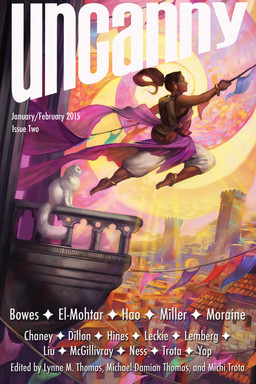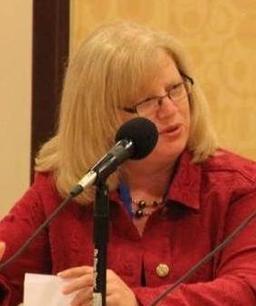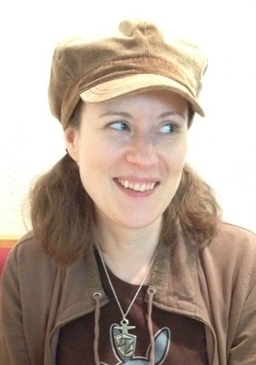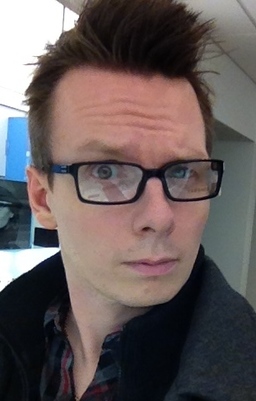Behind the Microphones: How the Uncanny Magazine Podcast Gets Made
 We’re currently in the middle of running the Uncanny Magazine Year Two Kickstarter. Uncanny Magazine is dedicated to bringing readers stunning cover art, passionate science fiction and fantasy fiction and poetry, gorgeous prose, and provocative nonfiction by writers from every conceivable diverse background.
We’re currently in the middle of running the Uncanny Magazine Year Two Kickstarter. Uncanny Magazine is dedicated to bringing readers stunning cover art, passionate science fiction and fantasy fiction and poetry, gorgeous prose, and provocative nonfiction by writers from every conceivable diverse background.
Not to mention a fantastic podcast featuring exclusive content. We’ve already funded and are currently working toward our stretch goals of extra stories for our readers.
Since Black Gate favorite C. S. E. Cooney was one of our Uncanny Magazine Podcast readers in Year One, we thought Black Gate’s readers might enjoy hearing how our amazing podcasting team puts together the Parsec Award-finalist Uncanny Magazine Podcast, which, every month, features a story and a poem from Uncanny along with an exclusive interview. While Lynne and Michael introduce each podcast, choose the content, and provide linking segments, the real work gets done by the rest of our awesome team, who spend a lot of time and energy making us sound great.
Having a great podcast was extremely important to us when we planned Uncanny Magazine. As many of you might know, Lynne and Michael are no strangers to podcasting. Lynne is the moderator of the two-time Hugo Award-winning SF Squeecast (with Elizabeth Bear, Paul Cornell, Seanan McGuire, Catherynne M. Valente, and David McHone-Chase), a member of the Hugo and Parsec-finalist Verity! podcast (with Deborah Stanish, Erika Ensign, Tansy Rayner Roberts, Katrina Griffiths, and L.M. Myles), and launched the Apex Magazine Podcast with Michael, Erika Ensign, and Publisher Jason Sizemore. Michael is also a member of the SF Squeecast and the Down and Safe podcast (with Amal El-Mohtar, L.M. Myles, and Scott Lynch).
So to create a world-class podcast, Lynne and Michael Thomas brought together the world-class team of Erika Ensign and Steven Schapansky as producers, Deborah Stanish as interviewer, and Amal El-Mohtar and C. S. E. Cooney as readers. We’ll let some of them tell you more about their roles at Uncanny.
Here’s Deborah.
Deborah Stanish

Having the opportunity to interview so many interesting and talented people is definitely what drew me to Uncanny Magazine. Both types of interviewing, print and podcast, present different challenges and opportunities. Responses to print interviews are usually well-thought out and crafted. They can be beautiful pieces of art all on their own, adding depth to the original work. Print interviews are the artist in their Sunday Best.
A podcast interview, however, always has an element of surprise. They can be a little rougher, a little more honest and, sometimes, go off in directions you’d never expect. Those are the ones I love best. With a podcast interview you have to be ready to abandon script when the guest says something unexpected and follow that rabbit down the hole. It’s a little scary and incredibly rewarding both to me and, I hope, to our listeners.
There are several challenges in creating a good podcast interview. The technical challenges in recording are fairly easy to overcome. (Of course I say that as someone who just has to talk, not look at raw audio!) I’ve interviewed people with podcast-quality microphones and I’ve interviewed people who use their mobile phone earbuds. I credit our fantastic producers with giving each interview as much polish as technically possible. I have supreme confidence that Steven is going to make each guest sound fantastic, whether by in tweaking the sound quality or editing out awkward pauses and fumbles.
The challenges in creating and conducting the interview are a bit different. I try to balance the line between introducing the guest to an audience who may be new, or only slightly acquainted, with their work while, at the same time, asking questions that aren’t repetitive or bore the guest. I’m sure every one of our guests have a list of questions they’d love to never have to answer again!

I probably do more research than necessary, reading old interviews, looking at past published works and scouring blogs and Twitter accounts. I’m always on the lookout for curious nuggets of information the guest has left on the table, whether it’s in their writing or in another interview. My working philosophy is that if I’m curious about something, our listeners will be curious as well.
Ultimately, my job as an interviewer is to make the guest comfortable, to celebrate their work, and to allow them to have fun while getting them to open up about their work and themselves in a way that is unique to Uncanny Magazine. Every interview is an opportunity to learn something new and exciting about a guest. And when that happens? It’s magic.
Erika Ensign and Steven Schapansky
For Steven and Erika podcasting is extra-special. It’s because of Steven’s Doctor Who podcast that they’re now married and living together in Canada. So they jumped at the opportunity to tag-team producing a podcast.
Either one can (and occasionally does) handle the whole thing, but their particular interests and strengths complement each other perfectly. Erika edits the story and poem, and Steven takes care of the interviews.
When all the individual pieces are complete, Erika and Steven sit down together and assemble the final podcast as a team. It’s not unusual for a high-five (or a kiss or just a shared grin) to follow a particularly devious or tricky edit.
Erika: I love editing the stories and poems. We have the most talented readers, so being the first to hear a story/poem gives me a little thrill every time. And there’s more to it than simply listening to make sure the words are right and the breathing and swallowing is minimized. Pacing is very important when listening to fiction. I often spend more time editing “space” than I do editing sounds. Whether it’s adding or removing space between phrases, I always take the time to make sure everything flows just right.

Steven: Editing interviews is second nature to me. I’ve performed over 100 podcast interviews myself, and edited all of those.
For Uncanny my goal is always to make the interviewee (and interviewer!) sound as good as possible and do my best to enhance the focus of the interview. I can tell when someone is getting to a point, and I want to ensure that point comes across to the audience as clearly as can be. I rarely cut out much in the way of content, though occasionally I’ll remove the “three-point-turns” — when an author starts an answer, backs up, restarts, and then gets on with it in the way they meant to in the first place.
And of course, I jettison many of the “ums” and “ahs” that occur when people are thinking over their answers. Though sometimes I leave in a few ums and ahs to make the listener wonder “Is this really edited? Or do they just sound that good?” You will never know.
One of the best parts of producing the Uncanny Magazine Podcast is recording the intro/outro/linking bits with Lynne and Michael. It’s an excuse to “get together” with good friends once a month and shoot the breeze. That camaraderie is only sweetened by knowing they’re creating something fantastic to share with the world.
The feedback about the podcast has been touching. Some people respond strongly to stories when they’re read aloud (and interviews when they can hear the author’s voice).
As podcast producers, Steven and Erika couldn’t be happier to facilitate that additional connection to the amazing works in Uncanny Magazine.
Lynne and Michael Thomas are the co-editors in chief and publishers of Uncanny Magazine. They live and work in DeKalb, Il.
[…] Curious about how Uncanny does such great podcasts? Lynne and Michael pull back the curtain in their recent article for us, Behind the Microphones: How the Uncanny Magazine Podcast Gets Made. […]